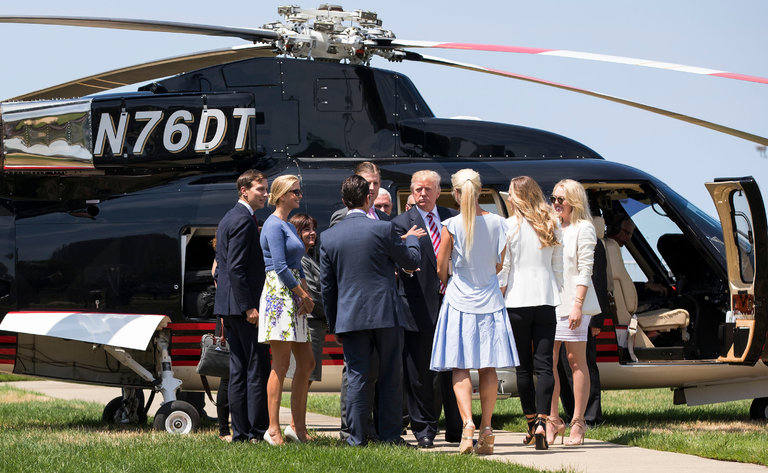President-elect Donald Trump granted a joint interview to the Times of London and Bild, a German publication, over the weekend, in which he laid out portions of his foreign policy strategy. Among the issues addressed were the sanctions placed on Russia as a result of its military annexation of Crimea, and how the incoming president views the international body NATO, which he has been critical of in the past.
Trump expressed a willingness to reconsider sanctions placed on the Russian state in exchange for a reduction in their nuclear arsenal.
“They have sanctions against Russia; let’s see if we can strike a few good deals with Russia. I think there should be less nuclear weapons and they have to be reduced significantly, that’s part of it. But there are these sanctions and Russia is suffering lots from it. But I think there are things…lots of people can profit from.”
Making these suggestions so soon after allegations were raised against the incoming president for having inappropriate ties to Putin’s regime demonstrates either an utter disregard for the views of those who have voiced concerns about where the president-elect’s loyalties lie, or a supreme confidence in the likelihood that such allegations will be proven false. During his campaign, many believed that Donald Trump could usher in a new level of international cooperation between American and Russian governments, but with recent concerns about the Kremlin maintaining compromising information on the incoming president for blackmail purposes, some may perceive the suggestion of removing sanctions as a bit too cooperative in the current political climate, regardless of the validity of the claims made against him.
The Kremlin responded to the suggestion via an official announcement on Monday morning, stating that “sanctions are not a question on our agenda, neither internally, nor in discussions with our international partners.”
The president-elect also reiterated his concerns about NATO that made headlines during the campaign. Last year, Donald Trump suggested that the United States may not support its NATO allies if the member nations fail to uphold their financial obligations to the organization. Although these sentiments were mirrored almost exactly by outgoing President Barack Obama in a speech he gave in Germany in April, many in the media and throughout the world saw Trump’s choice of words as an indication that American support for the organization may wane under the new president.
“I said a long time ago that NATO had problems,” Trump said in the interview. “Number one it was obsolete, because it was designed many, many years ago. Number two the countries weren’t paying what they’re supposed to be paying.” NATO nations are required to dedicate two percent of their gross domestic product to defense, a financial obligation only five member states, including the United States, are currently meeting.
“A lot of these countries aren’t paying what they’re supposed to be paying, which I think is very unfair to the United States,” Trump said. “With that being said, NATO is very important to me. There’s five countries that are paying what they’re supposed to. Five. It’s not much.”
Many, including Trump, have claimed that America’s NATO allies rely on the formidable defense infrastructure provided by the United States to protect them, choosing to allocate the funds that should go toward defense to other projects while operating under a blanket of American-backed NATO defenses to secure their borders. Barack Obama’s recent decision to send more than 3,000 U.S. troops to Eastern European nations in order to help secure borders against potential Russian aggression would seem to support the suggestion that NATO member states rely on U.S. support—though, per the original charter, that was to be expected.
Each nation’s requirement to spend two percent of their GDP on defense was always intended to place a larger burden on more powerful nations that could shoulder it, but Trump claims that failing to meet that two percent mark represents how these nations are taking advantage of the Collective Defense article of the NATO charter. Collective Defense, or Article 5 of the charter, stipulates that an attack on any member of NATO will be perceived as an attack on every member of the organization, though it does not require military intervention. Instead, the charter requires that each nation take “such action as it deems necessary, including the use of armed force.”
In other words, even if President Trump chose not to send military forces to support an attacked member of NATO, the United States may not be in violation of the charter—though international political fallout would likely be extreme nonetheless.
Already have an account? Sign In
Two ways to continue to read this article.
Subscribe
$1.99
every 4 weeks
- Unlimited access to all articles
- Support independent journalism
- Ad-free reading experience
Subscribe Now
Recurring Monthly. Cancel Anytime.
Russia, Trump’s best friend or worst enemy depending on which side of the ideological fence your vantage point sits on, also voiced agreement with the president-elect regarding NATO. Dmitry Peskov, who was said to be the man holding the Trump blackmail dossier, spoke on Vladimir Putin’s behalf on Monday regarding Trump’s assessment of NATO, saying, “The systematic goal of this organization is confrontation.”
The European Union has already started making moves to form a unified European defense fund, which many have viewed as a direct response to concerns about Donald Trump shifting American military support away from NATO. With only days left before Trump takes office, we likely won’t have to wait long to see just how the Donald intends to manage these developing international tensions.
Image courtesy of the New York Times










COMMENTS